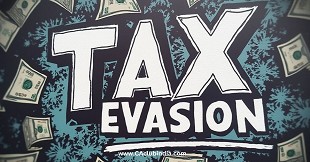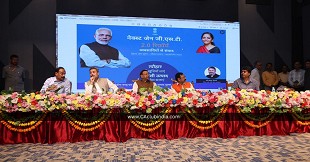GST News
Businessman Arrested for Rs 17.48 Crore GST Evasion
04 October 2025 at 06:54Thane GST authorities arrest Chandan Lakhara, proprietor of Moon Trader, for tax evasion of Rs 17.48 crore. The businessman allegedly claimed bogus Input Tax Credit of Rs 8.74 crore, causing massive revenue loss.
GST 2.0: NCH Receives Nearly 4,000 Calls, 69% Report Consumer Grievances
03 October 2025 at 09:03The National Consumer Helpline has received 3,981 GST 2.0-related calls, with 69% being grievances. Key issues include milk pricing, electronic goods, LPG, and petrol. Nearly 2,000 cases have been forwarded to CBIC.
CBIC Joins Special Campaign 5.0: Focus on e-Waste Disposal, File Review & Cleanliness
03 October 2025 at 06:26CBIC is actively participating in Special Campaign 5.0 (Oct 2–31, 2025) with a focus on e-waste disposal, file review, grievance redressal, and workplace cleanliness.
CGST Kanpur Organizes 'SAMVAD' to Discuss Next-Gen GST 2.0 Reforms
02 October 2025 at 08:25The Central Goods and Services Tax (CGST) department of Kanpur successfully organized 'SAMVAD' to discuss the Next-Gen GST 2.0 Reforms, bringing together key stakeholders from the industrial and trade community, tax professionals, and policymakers.
CBIC Withdraws Circular on Evidence Requirement for Supplier Discounts under GST
02 October 2025 at 08:19CBIC withdraws GST Circular No. 212/6/2024-GST on supplier compliance evidence under Section 15(3)(b)(ii) of CGST Act. New Circular No. 253/10/2025 eases compliance for discounts.
Govt Puts E-Commerce Platforms Under Scanner for Not Passing on GST Cuts
02 October 2025 at 08:13Govt monitors e-commerce platforms after 3,000+ complaints that GST rate cuts were not passed to consumers. Amazon, Flipkart assure compliance amid festive sales.
ED Attaches Rs 15.41 Crore Properties in Multi-State Rs 734 Crore GST Fake ITC Fraud
02 October 2025 at 08:08ED attaches Rs 15.41 crore worth of properties in Kolkata and Howrah linked to a Rs 734 crore GST fake ITC fraud involving 135 shell companies across three states.
Insurance Distributors to Bear GST Costs as Insurers Revise Commissions Post-Exemption
02 October 2025 at 08:04After GST exemption on health and life insurance policies, insurers like Tata AIG and ABHI cut commissions from Oct 1, 2025, passing GST costs to distributors.
Gross GST Revenue Surges 9.1% in September 2025, Touches Rs 1.89 Lakh Crore
02 October 2025 at 07:36India's GST collections hit Rs 1.89 lakh crore in September 2025, up 9.1% YoY. Imports drove growth with 15.6% rise, while states like MP, Meghalaya, and Sikkim posted strong gains.
Notebook Manufacturers Raise Alarm Over GST Inverted Duty Structure
01 October 2025 at 08:14Notebook makers warn GST inverted duty on paper and books will raise costs, block ITC and threaten domestic production and affordability for students.
Popular News
- Exceptions for Cash Payments Above Rs 10,000 under Rule 26 of Draft IT Rules 2026
- CBDT to Replace Forms 3CA, 3CB & 3CD with Consolidated Form 26
- Income Tax Rules, 2026 Notified: Rule-Wise Comparison with Old IT Rules, 1962
- Draft Income Tax Rules, 2026 Released: Major Changes in Capital Gains, Perquisites and Non-Resident Taxation
- CBDT Proposes New Form 130 for TDS on Salary, Pension and Interest Income Under IT Act
Trending Online Classes
-
DT & Audit (Exam Oriented Fastrack Batch) - For May 26 Exams and onwards Full English
 CA Bhanwar Borana & CA Shubham Keswani
CA Bhanwar Borana & CA Shubham Keswani -
IDT LIVE Exam Oriented Batch | May 2026, Sept 2026 & Jan 2027
 CA Arpita Tulsyan
CA Arpita Tulsyan














 CAclubindia
CAclubindia
